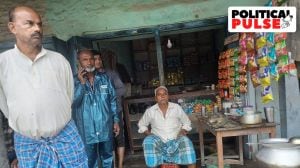Mumbai-Karnataka region, Bangalore took BJP to poll victory
When BJP general secretary Ananth Kumar walked into the BJP office on Sunday, his first remark to state president D V Sadananda Gowda...

When BJP general secretary Ananth Kumar walked into the BJP office on Sunday, his first remark to state president D V Sadananda Gowda was “we won 17 in Bangalore”. The comment is indicative of where the Congress lost the bulk of its battle for Karnataka.
With 28 seats at stake in the Bangalore Urban Region alone and another four in the Rural Region, this was considered to be an area where the Congress would trounce the opposition, especially following the return from gubernatorial duties of the state’s former Congress chief minister S M Krishna.
In the 2004 elections, the Congress with S M Krishna as the incumbent CM won 10 of the 15 seats in Bangalore, leaving the BJP only five. This time, in one of the biggest surprises of the 2008 polls, the BJP notched up a total of 19 seats.
With delimitation kicking in for the first time, the BJP was well served especially in the outlying areas of Bangalore. Analysis of Congress wins for Bangalore shows that they are largely restricted to the inner city areas.
In the neighbouring city of Mysore, however, the Congress had a dream run winning eight out of 11 seats and reducing the JDS, which had won six seats last time, to only one.
In fact, in the first phase of polls held for 89 seats on May 10 the Congress emerged with as many as 40 seats despite the defeats in Bangalore. The BJP got 28 seats and JDS 18.
The JDS had another virtual wipe-out in urban areas, bearing the brunt of public anger over the political gamesmanship displayed by the party’s national president H D Deve Gowda over the past four years.
Gowda’s party however remained a force to reckon with in the Vokkaliga agricultural heartland of Hassan and Mandya, winning nine of their 18 first-phase seats.
If there is a second region that has poll vaulted the BJP to victory in the current elections, then it is the mining district of Bellary and the neighbouring Davangere region that went to polls in the second phase for 66 seats, on May 16.
From holding three seats in Bellary in 2004, the BJP virtually saffron-washed the region by winning eight out of the nine constituencies on the strength of the Reddy brothers who are a virtual money pillar for the party. For the eight seats in Davangere, the BJP won six seats this time—three more than in 2004.
Through the second phase, BJP emerged with 39 seats, the Congress got 18 and the JDS lost substantial ground hitting merely six seats when compared to the 11 achieved in in 2004. The one bright spot for the Congress was its moderate return in the coastal districts of Dakshina Kannada and Udupi. Virtually wiped out in 2004 when it won only three of 15 seats, this time, the Congress managed to win five out of the 13 seats that currently exist here.
On May 22, in the third phase of polling for 69 seats in the northern districts of the former Mumbai-Karnataka and Hyderabad Karnataka region, the BJP again pulled off a surprise surge in the Belgaum district, capturing nine out of 18 seats (up from three in 2004). The Congress won seven; delimitation was a factor again, with the number of constituencies increasing sizably as in Bangalore.
The BJP sway over other parts of the Mumbai-Karnataka region continued with the party getting six out of seven seats in Dharwad and five out six in Haveri. The Hyderabad-Karnataka district of Gulbarga offered the Congress a little solace with seven candidates emerging victorious in the 12 seats here.
In the run-up to the final phase, it was believed that any party that could win more than half the 69 seats would have a good shot at forming the next Government. The BJP by capturing 39 seats has done just that.



- 01
- 02
- 03
- 04
- 05




























